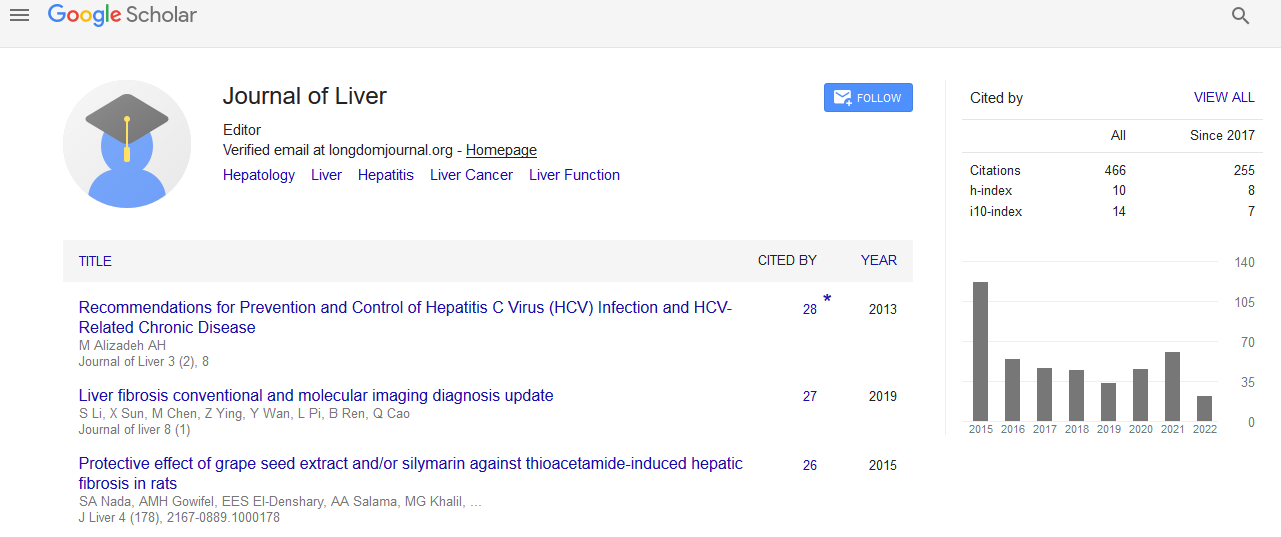PMC/PubMed Indexed Articles
Indexed In
- Open J Gate
- Genamics JournalSeek
- Academic Keys
- RefSeek
- Hamdard University
- EBSCO A-Z
- OCLC- WorldCat
- Publons
- Geneva Foundation for Medical Education and Research
- Google Scholar
Useful Links
Share This Page
Journal Flyer

Open Access Journals
- Agri and Aquaculture
- Biochemistry
- Bioinformatics & Systems Biology
- Business & Management
- Chemistry
- Clinical Sciences
- Engineering
- Food & Nutrition
- General Science
- Genetics & Molecular Biology
- Immunology & Microbiology
- Medical Sciences
- Neuroscience & Psychology
- Nursing & Health Care
- Pharmaceutical Sciences
Immune persistence after hepatitis B vaccination in infancy: Fact or fancy?
CO-ORGANIZED EVENT: 5th World Congress on Hepatitis & Liver Diseases & 2nd International Conference on Pancreatic Cancer & Liver Diseases
August 10-12, 2017 London, UK
Terence T Lao
Prince of Wales Hospital, Chinese University of Hong Kong, Hong Kong
Scientific Tracks Abstracts: J Liver
Abstract:
The hepatitis B vaccine has been in use for more than three decades and its efficacy has been widely reported. In Hong Kong, excellent vaccine coverage through an efficient public health care system, together with supplemental programs and easy availability of the vaccine, meant that most young pregnant women, and university students at entrance, should have been protected. Yet data from Hong Kong has not indicated a progressive decline in maternal carriage of hepatitis B virus (HBV). On the other hand, significant increase in the prevalence of HBV infection and a positive correlation with age has been found in students at university entrance, and in young mothers aged 25 years or less. This paradoxical phenomenon is most likely related to clinical vaccine failure. A number of factors are involved, such as the failure to respond to a primary series of hepatitis B vaccination in infancy, the waning of antibody titres with age, and loss of anamnestic response in a significant portion of the vaccines. We have shown that up to one in five of children who had received a full course of hepatitis B vaccination in infancy failed to develop an immune response. Furthermore, among adolescents and young adults covered by the universal vaccination program in infancy, waning of antibody titres to non-protective levels and loss of anamnestic response are not uncommon by the time of university entrance, despite a low incidence of HBV infection. Taken together, there is concern for the purported life-long protection conferred by hepatitis B vaccination in infancy. The duration of protection should be re-examined in further studies and remedial measures considered if long term protection is found to be insufficient. Otherwise, the efforts to control HBV infection, especially in high endemicity regions, with universal vaccination in infancy would be rendered futile.
Biography :
Terence T Lao is a specialist in Obstetrics, Gynaecology and Maternal-Fetal Medicine. He has received training in Hong Kong; London, UK; and Canada. He is currently a Professor in the Department of Obstetrics and Gynaecology, Chinese University of Hong Kong, Prince of Wales Hospital, Shatin, Hong Kong. His clinical and research interests are oriented around maternal medicine, especially endocrine and hepatic problems, hypertension, and hepatitis, as well as the management of high risk pregnancy. He is a reviewer of many international journals, and serves on the Editorial Board of three. He has 442 publications, including abstracts, listed under Google Scholar.

